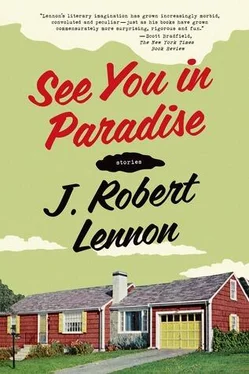The sitter looked at the two of them, who stood apart, not touching. She wanted very badly to leave. “I’ll go now,” she said. She bent down and picked up her books and notes from the coffee table. “I’m sorry. Really, I am. I can babysit later this week, if you want. If you need help.” She certainly did not want them to take her up on the offer, and they didn’t ask for her name or phone number. She said, “I’m so sorry.”
“Okay,” said Mrs. Lo. She looked at the ceiling, as though the children might be visible through it. The sitter moved to the door. She looked back at Mr. and Mrs. Lo once more. “Goodbye,” she said, and walked out.
She walked home in the dark, feeling the photograph bending in her back pocket. It was a beautiful, clear night. A spring smell, the smell of dead things exposed to light and warmth, filled the air. The sitter felt a strange precipitousness, as if a hand were pushing her from behind, threatening to topple her. She jogged the last few blocks to her dormitory, clutching her books in both arms.
It was past two when she got to her room. She had a roommate, but the roommate was out, studying with her boyfriend. She put down the books and went to the sink, where she filled a glass with water and drank it. Then she lay down on her bed in the dark and closed her eyes. She tried to think about the Gearys — it seemed like the right thing to do — but only the children came to mind: Emma’s determined walk, the way she pumped her small fists, the sound of her small sneakers dragging across the carpet. She thought about John’s obsession with dinosaurs. All children liked dinosaurs, but at this moment his interest seemed incredible to her. All the amazing things he knew, the facts. She thought about this for a while, and then her phone rang. She got up and went to the kitchen, where she had left it, and sunk into a chair as she answered. It was Officer Clarke.
“I wanted to thank you,” he said. “Most people would have gone home.”
“Anyone would stay.”
“Well, thanks anyway. It was a good thing you did. I’m here now and Mr. and Mrs. Lo are seeing to the children.”
“Are they awake?”
“No,” said Officer Clarke, but he was obviously lying. “They’re inside,” he added. “Actually, I’m sitting in my patrol car.”
“Oh,” she said. She felt the invisible hand pressing into her back, and she leaned forward, supporting herself with her hand on the table’s edge.
“Listen,” said the policeman, “I was wondering—”
“Officer Clarke?” she said suddenly.
“Yes?”
“I have to tell you something.”
“What is it?” he said.
“I stole something. From the Gearys’ house. I stole a photograph.” There, she thought: that’s better.
A silence followed. If he asked her to return the photo, she would go back right now and do it. But he said, “I guess that’s all right. I guess … you just keep it.”
“Okay,” she said. She stood up. There was another silence between them now, a companionable one, even though she was alone at home and he was sitting in a car in someone’s driveway. She listened to him breathing and didn’t feel the need to add anything. At last he said her name.
“Yes?” she said.
“I’d like to … see you again. Sometime. When you’re … over this experience.”
For a moment she didn’t know what he meant. She thought it had something to do with the night’s events. Then she understood. She realized that she wanted him to come over right now. She would give him a cup of coffee, or maybe a beer, even though she was slightly underaged, even though he busted her once for drinking. She was sure he didn’t remember the beer party, or at least not her involvement; he had taken one look at her and told her to go home. He said she was getting off easy this time. Now she thought: a policeman, asking me out. Her friends, were she to tell them, would be shocked and amazed. But all she said was, “Yes, okay.”
“Is it really okay? I know I’m kind of old.”
“You’re not old.”
“I’m twenty-eight. I was married before.”
“Twenty-eight’s not old.”
He said, “I’m sorry about tonight.”
“Me too,” she said. And then she remembered something.
“All right, then. I have to go. I’ll call you. I think … I think you’re a very good person. I don’t know how I know that.”
After a moment she said “Thank you,” though of course there was no way he could know that. Anyone would have stayed. Nevertheless she liked hearing him say it. She hung up the phone and went back to bed. She didn’t want to get undressed. She lay there, her hand on her jeans, drawing shallow breaths.
What she remembered was the dream she’d been having, hours ago, the one that Officer Clarke interrupted. In it, she was working at a warehouse of some kind. She had to pack some very tall shelves with boxes, pamphlets, bulging envelopes, glass jars. There were so many of them, and they were all different sizes. She wedged them and turned them, trying to fill every inch of available space, trying to prevent the objects from squeezing out and falling on the floor. More objects were piled on a table behind her, and the pile was growing, supplemented by unseen workers. There was no way they would fit.
It was an anxiety dream. The memory of it sent a thrill through her. She shivered, as if with pleasure. It seemed wrong to be so excited; she tried to put the feeling away, to make herself feel the way she thought was appropriate, but the excitement persisted. It was all over her body, the feeling of getting away with something.
Total Humiliation in 1987
We rose at four in the morning — Margaret, the girls, and me — and zombied into the already-packed van to depart on our final family vacation to the little cabin on the shore of Lake Craig. The month was August, the sky was purple and empty, and the trees bowed before the oncoming thunderstorm that, with any luck, we wouldn’t be here to enjoy. The drive into the mountains would take five hours, and I had loaded up the iPod with a special family vacation playlist that began with mellow ambient electronica and minimalist classical and gradually ramped its way up to classic rock and big band jazz. If I had calculated correctly, we would hear Duke Ellington’s “Rockin’ in Rhythm” (the Fargo 1942 version) as we turned onto the winding switchbacked road that, a thousand feet later, would hoist us over the pass between Mounts Ringwood and Edgar and down into our week of isolation from the world.
Everyone but me was asleep before we’d even left the county: Margaret with the seat belt supporting her wan face like a sling; Lynnae and Lyrae conked identically in opposite corners of the back seat, in their way-too-skimpy hipster duds. Lyn was eleven, Rae was thirteen, and both knew something funny was going on, though neither had dared ask what. Heaped behind them were our possessions — recreational equipment, outdoor clothing, plastic sacks of food, a case of beer, a case of wine. At each of the girls’ feet lay a satchel full of personal possessions — Rae, no doubt, her phone, her journal, and the thick romance paperbacks I winced every time I laid eyes on, absolutely contributing to her affection for them. Lyn’s bag was most likely filled with gum and candy wrappers, her own music player (probably stuffed with contraband pop), and the nine-hundred-page science fiction epic she was determined to finish reading this week. Margaret’s leather backpack was probably filled with work — menus, recipes, staff schedules — and her beloved BlackBerry, fitted into its fetishy leather holster.
I had brought little, and had nothing with me in the driver’s seat, save for my water bottle. “That’s because,” Margaret had said without looking at me, when the previous night I had proudly stated my need for nothing more, “you are uncomplicated,” the word signifying a whole collection of shortcomings I was supposed to embody, and which had come, in her mind, to constitute a kind of passive aggression. I did not entirely understand this theory and had vowed to give it some serious thought while we were at the lake. As for keeping a stash of goodies beside me in the car, what was I supposed to be able to do while driving, other than drink water? But this was unproductive thinking, Margaret would say, were she awake and I speaking my thoughts aloud, so I clammed up mentally and tried to focus on the road.
Читать дальше












